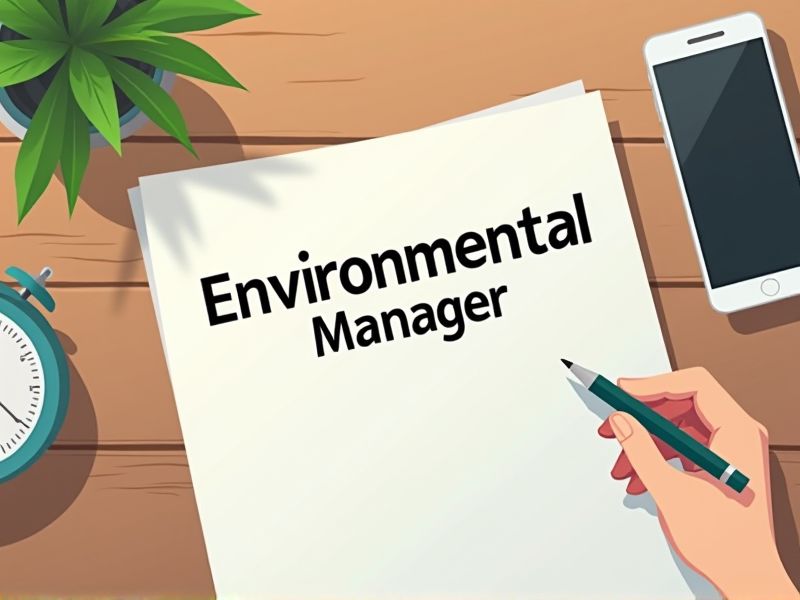
Environmental Managers play a critical role in implementing sustainable practices and ensuring regulatory compliance. Certifications provide them with the specialized knowledge required to navigate complex environmental laws and best practices effectively. Earning certain credentials can also enhance their credibility, allowing them to drive more impactful sustainability initiatives. Key certifications that can prove beneficial for an Environmental Manager include the following.
Certified Environmental Professional (CEP)
A Certified Environmental Professional (CEP) is needed for an Environmental Manager to validate expertise and credibility in the environmental field, enhancing trust with stakeholders. The certification often leads to improved compliance with environmental regulations, reducing potential legal risks for organizations. CEPs are equipped with updated knowledge and skills, facilitating the implementation of sustainable practices and innovations. More organizations demand certified professionals in response to increasing environmental scrutiny and accountability measures.
LEED Accredited Professional (LEED AP)
The LEED Accredited Professional (LEED AP) certification is crucial for an Environmental Manager because it provides a comprehensive understanding of sustainable design and construction practices. This certification ensures that managers can lead projects to meet LEED standards, which can result in reduced operational costs and enhanced energy efficiency. An Environmental Manager with LEED AP credentials is better equipped to implement sustainable practices that contribute to environmental conservation efforts. The certification also demonstrates a commitment to industry standards, which can improve a firm's reputation and increase its competitiveness in the market.
ISO 14001 Lead Auditor
An Environmental Manager with ISO 14001 Lead Auditor certification can effectively assess and ensure compliance with environmental standards, as the training provides a deep understanding of the ISO 14001 framework. Possessing this certification enables one to conduct thorough audits that identify areas for improvement, facilitating more sustainable business operations. The lead auditor certification instills confidence in stakeholders and regulatory bodies by demonstrating a solid commitment to environmental management. This enhanced capability often translates into more effective communication with stakeholders and improved organizational reputation.
Certified Hazardous Materials Manager (CHMM)
A Certified Hazardous Materials Manager (CHMM) is essential for an environmental manager because they possess specialized knowledge in handling and managing hazardous materials, which mitigates the risk of environmental contamination. Their expertise ensures that a company remains compliant with increasingly complex environmental regulations, avoiding legal penalties and financial losses. With a CHMM's skill set, organizations can develop and implement effective hazardous waste management plans, enhancing overall workplace safety. A CHMM's presence also strengthens an organization's reputation by demonstrating a commitment to environmental responsibility and sustainability.
Certified Environmental Auditor (CEA)
An Environmental Manager needs a Certified Environmental Auditor (CEA) to ensure regulatory compliance and mitigate risks associated with environmental laws. By employing a CEA, a company can improve its sustainability practices, enhancing its reputation and avoiding costly fines. A CEA provides specialized expertise to identify environmental impacts and suggests effective remediation strategies. This leads to improved operational efficiency by integrating environmental audits into the organization's overall management system.
Certified Sustainability Professional (CSP)
An Environmental Manager with a Certified Sustainability Professional (CSP) credential is more equipped to implement effective sustainability practices, ensuring compliance with evolving regulations. The CSP certification enhances a manager's ability to develop strategies that minimize environmental impact and promote resource efficiency. It provides the knowledge to align organizational goals with sustainable development frameworks, attracting eco-conscious clients and stakeholders. Holding the CSP demonstrates commitment to continuous improvement in sustainability, fostering a culture of environmental responsibility within the organization.
Environmental Management Systems (EMS) Auditor Certification
Environmental Manager needs EMS Auditor Certification because it validates their understanding of environmental regulations and standards. It ensures they can effectively assess and improve organizational environmental performance. Certification enhances their ability to identify non-compliance issues that could lead to legal penalties or reputational damage. It increases the credibility of the environmental management processes within an organization, facilitating smoother communication with stakeholders.
Certified Energy Manager (CEM)
Certified Energy Managers (CEMs) offer expertise in energy efficiency, which directly reduces environmental impact through decreased resource consumption. Their specialized knowledge helps in implementing sustainable practices, aligning closely with an Environmental Manager's goals. By identifying energy-saving opportunities, they contribute to lower greenhouse gas emissions. Regulatory compliance demands and cost-savings initiatives also make CEMs crucial for effective environmental management.
OSHA HAZWOPER Certification
The OSHA HAZWOPER Certification is necessary for an Environmental Manager because it ensures compliance with regulations for handling hazardous substances safely. This certification equips managers with critical knowledge and skills to protect workers from health risks associated with environmental hazards. With this certification, managers are better prepared to manage and respond to hazardous waste operations and emergency situations. Certified managers contribute to maintaining workplace safety and environmental integrity, reducing the risk of accidents and liabilities.
Certified Safety and Environmental Manager (CSEM)
The role of a Certified Safety and Environmental Manager (CSEM) enhances the effectiveness of an Environmental Manager by providing specialized knowledge in safety regulations. Certification ensures adherence to legal and environmental standards, preventing costly violations and enhancing compliance. Expertise in safety and environmental management reduces workplace incidents, leading to a safer and more sustainable operation. CSEM status enriches professional credibility, influencing stakeholder trust and organizational reputation positively.
Summary
When you obtain certifications as an Environmental Manager, you enhance your expertise and credibility in the industry. This often results in increased career opportunities and potential salary growth due to your specialized skills. Companies may seek your guidance more frequently, improving their sustainability practices and compliance with environmental regulations. The industry might also witness improvements in environmental performance, driven by your certified competence.
